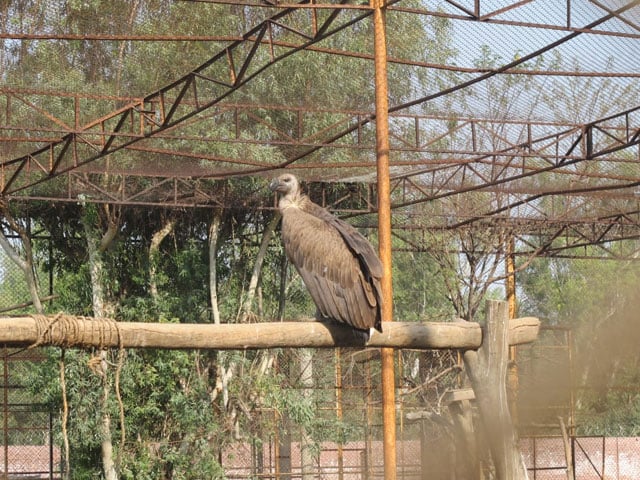In an ambitious endeavor to preserve the dwindling population of white-rumped vultures, WWF Pakistan launched a comprehensive breeding program spanning the rural landscapes of Sindh and selected districts in Punjab.
Initiated in 2015, the ‘Vulture Restaurant,’ an artificial habitat meticulously crafted by WWF, has begun to bear fruit, witnessing the birth and successful maturation of 32 white-rumped vultures.

The brainchild of WWF Pakistan’s regular planning, this innovative habitat mirrors the natural environment. Constructed with a combination of wood, grass, iron structures, and iron nets.
Aiming to seamlessly represent the vultures’ native surroundings, the habitat ensures a conducive space for the breeding and nurturing of newborn vultures.
Read More: CM Punjab Mohsin Naqvi Announces Reforms for License Processing
Muhammad Jamshed Iqbal Chaudhry, WWF’s Senior Manager of Research and Conservation, recounts the eight-year journey. Noting that the program commenced with adult vultures of the white-rumped variety.
Over the years, 2 to 3 fledglings joined the ranks annually, marking a steady success in sustaining the vulture population.
However, the success of this initiative is juxtaposed against a stark reality revealed in a survey conducted two years ago.
The study exposed the continued administration of three types of painkillers. Crucial contributors to the decline of donkeys, during various diseases in livestock across 38 districts in Punjab.
Jamshed Iqbal underscores that vultures, unlike other animals, are not carriers of rabies. Emphasizing their crucial role in maintaining the natural balance by cleaning up deceased animals.
Reflecting on the broader ecological impact, experts attribute the decline of vulture populations in the early ’90s to the indiscriminate use of painkillers in livestock.
As millions of donkeys began disappearing in 1997, the injection of painkillers led to renal failure and a surge in deaths.
Read More: FIA Takes Stride Against Human Trafficking: Launches Pioneering TIP Hotline
The vulture, primarily a scavenger depending on dead animals, suffered the collateral consequences of this medication misuse.
Experts stress that the kidneys of vultures fail after consuming meat from animals treated with these drugs, leading to their eventual demise.
This issue extends beyond Pakistan, affecting vulture species in India, Bangladesh, and Nepal. Muzam Khan, WWF’s technical director, highlights that 7 out of 8 vulture species worldwide are found in Sindh and Balochistan. Underscoring the urgency of preserving these vital creatures.
Such a measure is deemed indispensable for the survival of vultures. The restoration of ecological equilibrium, as the decrease in vulture populations has led to a dramatic increase in other animals.
Beyond its immediate success in Changa Manga. WWF’s commitment to vulture conservation transcends national borders, acknowledging the shared responsibility to protect these essential species.


